Окрошка
Sometimes Russians seem insane, particularly in their desire to drink hot tea and eat hot soup for lunch in the middle of summer. But they have one soup that is cold that they also like, and it is called окрошка. We don't have any special name for it in English, so we just transliterate it as okroshka. Essentially it is a cold vegetable soup for which the base is kvas, a beerish liquid made of a mildly fermented bread mash, which has almost no alcohol content. If you are going to have soup in summer, it makes sense to my American mind to have this relatively light and cool one. Here's a picture of the окрошка from the Трали-Вали cafeteria at one of the universities in Kazan:
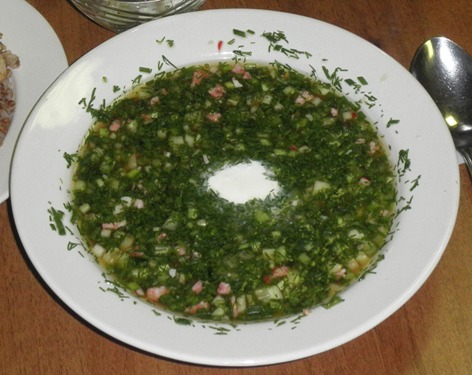
There are quite a few variations on окрошка. If you want to specify that you are making it with квас, then you call it окрошка на квасе. If you use water and кефир instead of квас, then you call it окрошка на кефире. Yesterday morning I was sitting at my currently favorite overpriced (but very tasty) coffee place, Кофейня «Капитал», in Kazan when I spotted this advertisement:
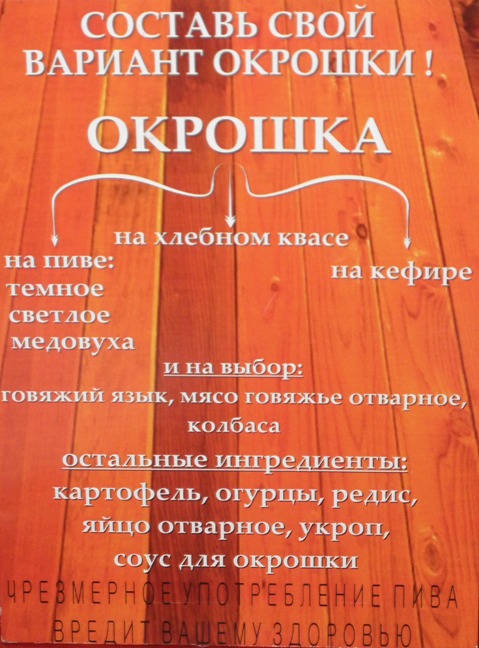
It says that they will make окрошка special for you not just with kvas, not just with kefir, but, if you prefer, with BEER! That's right, окрошка на пиве! You can have it made with dark beer, light beer, or honey beer! Beer soup for lunch... does that not sound like redneck heaven??? Plus they will be happy to add beef tongue, boiled beef, or sausage. See if you can figure out what the остальные ингредиенты "remaining ingredients" are from the sign.
Here are some sample sentences:
| Окрошка на светлом пиве мне не очень понравилась. | I didn't care for the okroshka made with light beer. |
| Мама всегда готовит окрошку на кефире. | Mom always makes kefir-based okroshka. |
| Я считаю, что редиска в окрошке не нужна. | I think you can do without the radishes in okroshka. |
| Бабушка всегда угощала внуков окрошкой. | Grandmother always treated the grandkids to okroshka. |
Мастер
On Saturday I was sitting just outside the men's section of the place where I get my hair cut here in Kazan, when a guy walked up and asked «Сколько там мастеров?» A second-year student of Russian would probably have translated the sentence "How many masters are there?" and would then have no idea what it meant. Here's the scoop. The word мастер in Russian often bears the meaning "someone qualified in a particular trade." In other words, he wanted to know how many barbers there were there that day.
The word itself is one of those that have a stressed -а in the nominative plural, and thus is end-stressed through the plural instead of stem-stressed:
| Sg | Pl | |
| Nom | мастер | мастера |
| Acc | мастера | мастеров |
| Gen | ||
| Pre | мастере | мастерах |
| Dat | мастеру | мастерам |
| Ins | мастером | мастерами |
There is no commonly used word in English that is quite as general as мастер in this sense, so when translating it, it is best to substitute the common name of the tradesman who practices the trade in question. Thus, if you are sitting outside an establishment that cuts men's hair with the old-fashioned standard cuts, the phrase «Сколько там мастеров?» is best translated "How many barbers are there?" The lovely and willowy Розанна who cuts my hair also does women's hair and can color hair as well. She would probably object to the word barber, and in fact someone with all those skills in the States would be better labeled a "hair stylist," so in this case the best translation may be "How many hair stylists are there?" or "How many stylists are there?"
I was in the dormitory of Moscow State University in 1986. My bathroom sink began to come out of the wall. The floor attendant said «Я вызову мастера». In this case she meant the guy who takes care of the dorm's minor maintenance requests, so her sentence would be best translated as "I'll call the handyman" or "I'll call the maintenance man." (BTW, when he showed up, he simply took a look at the sink, shoved it bank into the wall and smeared some cement over the screw and brace that held it in place. The wall was cinderblock. And the sink was anchored to the cinderblock by a screw... The word мастер struck me as completely ridiculous in that context.)
Thus if you summon a мастер to fix the plumbing, translate мастер as plumber. If you summon a мастер to fix your electrical outlet, translate it "handy man" or "electrician," depending on just how qualified the guy is.
Пломбир
Although the generic word for ice cream in Russian is мороженое, you also need to know the word пломбир. Ordinary мороженое per Russian standards contains 2.5 - 4% milk fat, which in the States we used to call "ice milk" instead of "ice cream," although nowadays it is sometimes called "low-fat ice cream". Пломбир according to the same standards has 12-13% milk fat. If you think that that makes пломбир smooth and creamy and delicious, you are exactly right. Most US ice cream has high fat content, so пломбир can usually simply be translated into English simply as "ice cream".
Пломбир comes in all sorts of forms, just like regular мороженое. My most recent taste was in this fun brand:
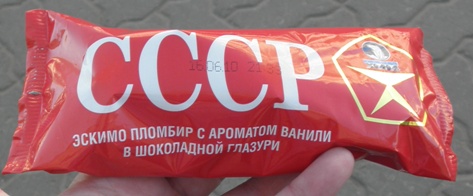
Once you unwrap it, it's basically an ice cream with a chocolate coating:

I came across a couple off ads recently with the word in them. This first one is on an ice cream stand, and it means "For the world, peace; and for you, plombir." It's cute because it rhymes:
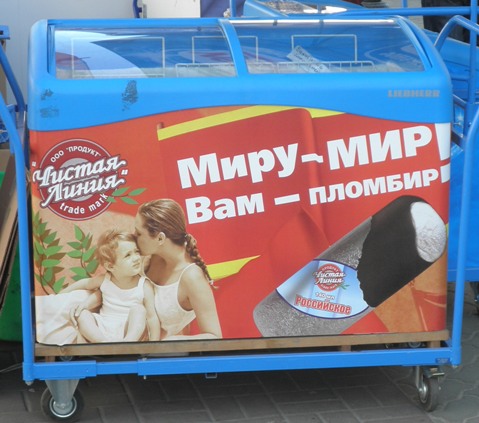
This ad says, "Gold Standard is plombir #1 in Russia." Gold Standard, obviously, is a brand name.
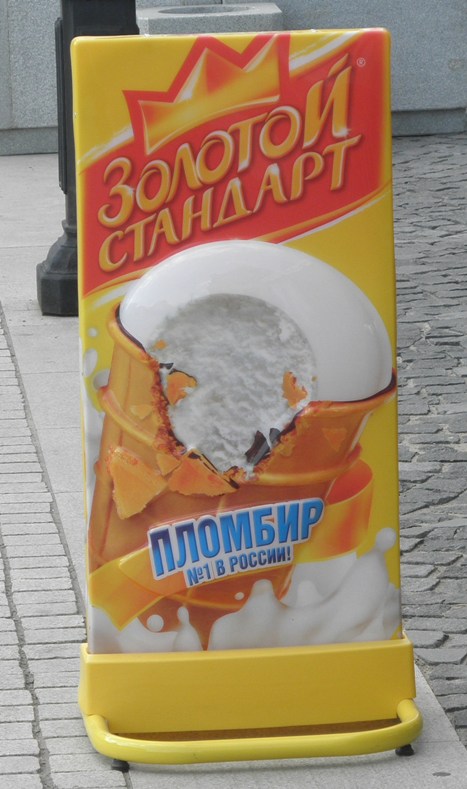
And here are some sample sentences:
| Я скучаю по пломбиру. (source) | I miss [eating] ice cream. |
| Пойду за пломбиром. | I'm heading out to get ice cream. |
| Невообразимая роскошь на борту самолета — угощение пломбиром с долькой киви. (source) | One unimaginable luxury on board the airplane is [that passengers are] treated to ice cream with a slice of kiwi. |
| Качество украинского пломбира удивило инспекторов. (source) | The quality of Ukrainian ice cream has surprised inspectors. |
Майонез
The most essential sauce of western cookery is doubtless mayonnaise, which in Russian is майонез. It is a perfectly regular noun, so it's declension causes no difficulty.
Although the Russians' love of alcohol is legendary, and their love of sour cream is nearly obsessive, their passion for mayonnaise is equally astonishing. For instance, I was at a cafe this morning and ordered manty, which are kind of like enormous ravioli. Doubtless hearing a bit of an accent in my voice, the cashier asked whether I wanted ketchup or mayo with them. Well, duh, I know the answer to that one: we are in Russia so it has to be mayo! Here's a picture of the manty. Note the quantity of mayo on them:
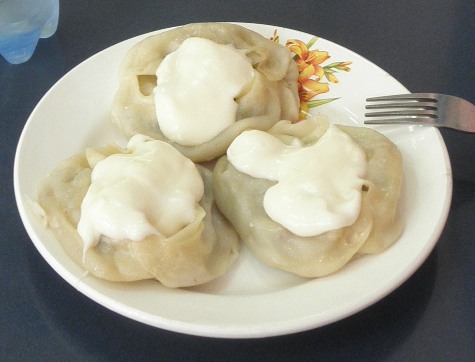
The Russians also garnish soups with a dollop of mayo:

If you mix mayo with 100 grams of any vegetable matter, then they call it a salad. One of the most famous Russian salads is called «сельдь под шубой» "herring under a fur coat," which when you first look at it seems to have little mayo:
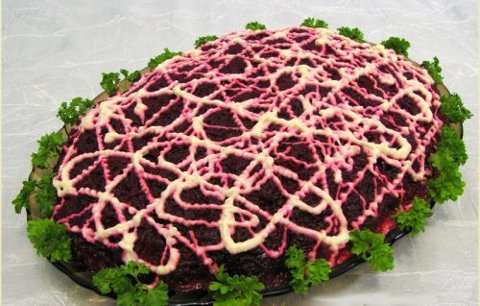
Let's examine the recipe. We start with the ingredients:
- 300 g herring, shredded
- 300 g grated, boiled potato
- 300 g grated, boiled carrot
- 300 g grated, boiled beets
- 300 g grated apple
- 150 g grated
- mayo
Now the procedure:
- Place the potatoes on a serving dish. Even them out. Cover with mayo.
- Put the herring on top. Cover with mayo.
- Put the onion on top.
- Put the carrots on top of the onions. Cover with mayo.
- Put the apples on the carrots. Cover with mayo.
- Cover with beets. Even the layer out.
- Garnish with mayo.
To the American palate this quantity of mayonnaise is simply grotesque. We immediately think of the clogging of our carotid arteries and our inability to have six-pack abs or a shapely waistline. But this is perfectly normal for a Russian dish. And truth to tell, once we get past our cultural knee-jerk reaction, it tastes just fine. So here are some sample sentences:
| Бутерброды без майонеза для меня не бутерброды. (source) | To me, sandwiches without mayonnaise are simply not sandwiches. |
| Как относиться к майонезу? (title of this article) | What should we think about mayonnaise? |
| Всегда заправляю окрошку майонезом. | I always garnish okroshka soup with mayonnaise. |
| Для многих блюд майонез незаменим. Например, с чем ещё можно делать салат из крабовых палочек? (source) | Mayonnaise is irreplaceable in many dishes. For instance, what else could you make crab salad with? |
| Я майонез прекрасно научилась заменять натуральным йогуртом или оливковым маслом. Конечно, это не так вкусно, но для меня главное — польза. (source) | I have learned how to substitute natural yogurt or olive oil for mayonnaise. Of course, it doesn't taste as good, but for me the most important thing is healthiness. |
| Я почти всё ем с майонезом, суп, щи, салат, яичница и конечно не забываю добавить майонез в жаренную картошку и пельмешки.ммм (source) | I eat almost everything with mayonnaise: soup, cabbage soup, salad, fried eggs, and of course I don't forget to add mayonnaise to fried potatoes and pelmeni. Yum. |
Note: the н is pronounced hard in this word, thus [маянэз].
Диалог № 1
In our first years of learning Russian we spend a lot of time learning conjugation and declension, trying to figure out how to weave sentences together with subjects and direct objects and prepositional phrases. It's an amazing grammatical dance that has its own beauty, though perhaps it takes ten years before one really sees the beauty part... Anyhoo, so you take your first trip to Russia, and you are braced to collide with strange cases and unreal conditional clauses and sentences that last longer than Kafka's, and then you are stunned to learn that it's the really short sentences with nothing but the nominative case that entirely floor you.
For instance, yesterday morning I was in my currently favorite eating place, and I heard the following conversation:
| Треугольник. | A triangle. |
| Вы здесь будете? | Will you here? |
| С собой. | With one's self |
| Нагреть? | To warm up? |
| Нет. | No. |
I can pretty well guarantee you that right now first- and second-year readers are thinking "What the heck?" The conversation is between a woman customer (blue lines) and the cashier (yellow lines). Spend a minute or two to see if you can figure out what the heck they are talking about, then click 'read more' for a line-by-line explanation.
<< 1 ... 53 54 55 ...56 ...57 58 59 ...60 ...61 62 63 ... 158 >>